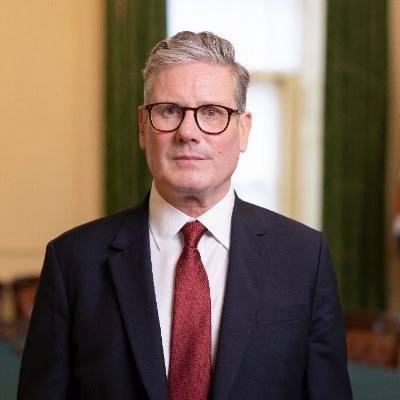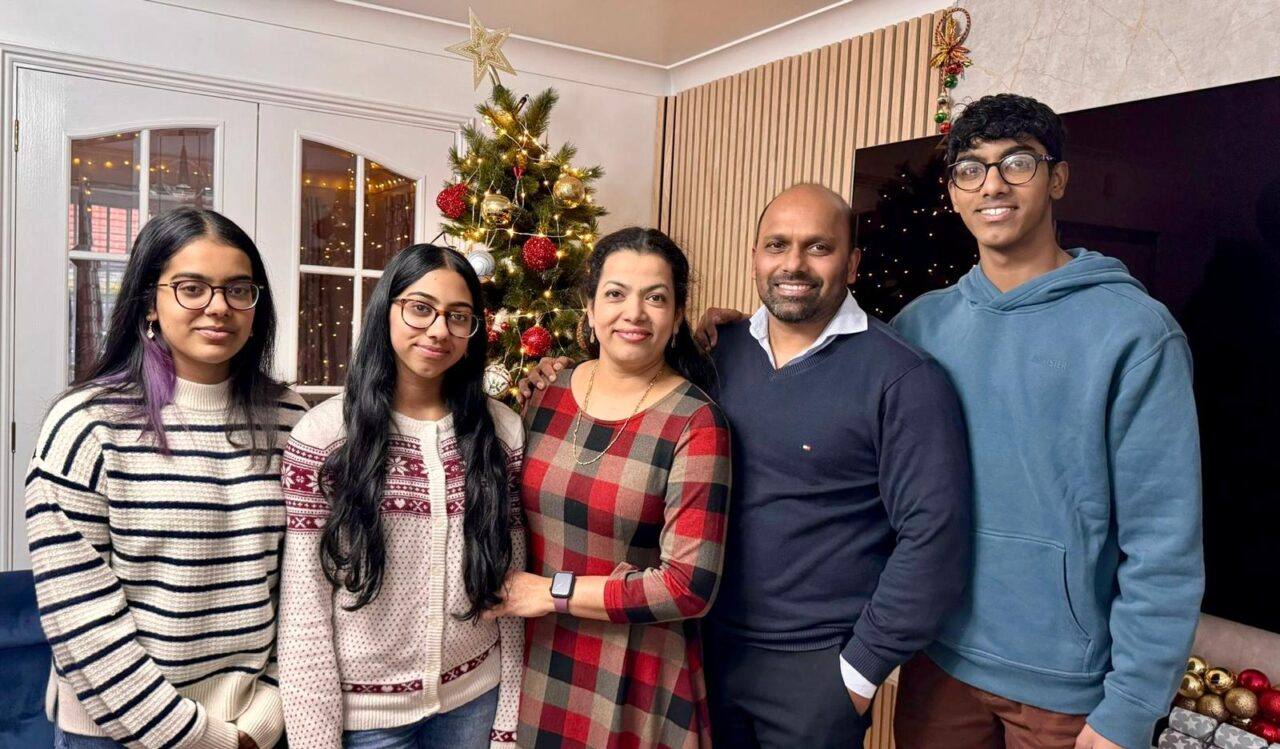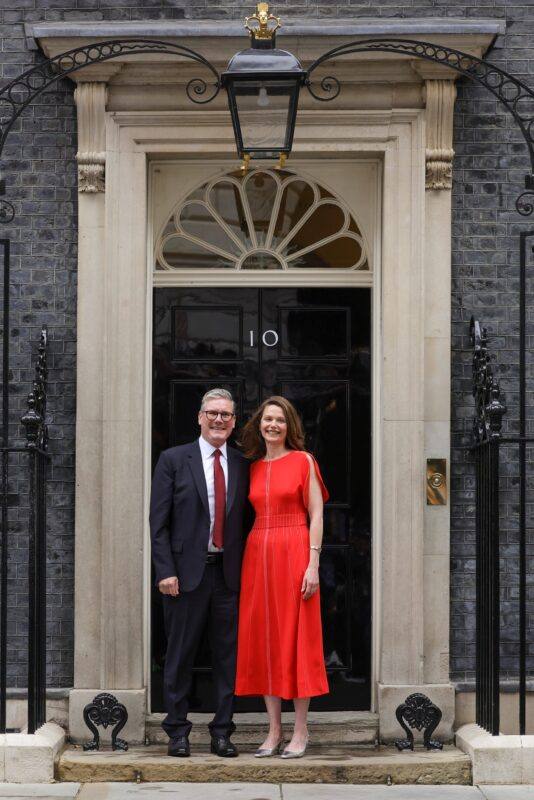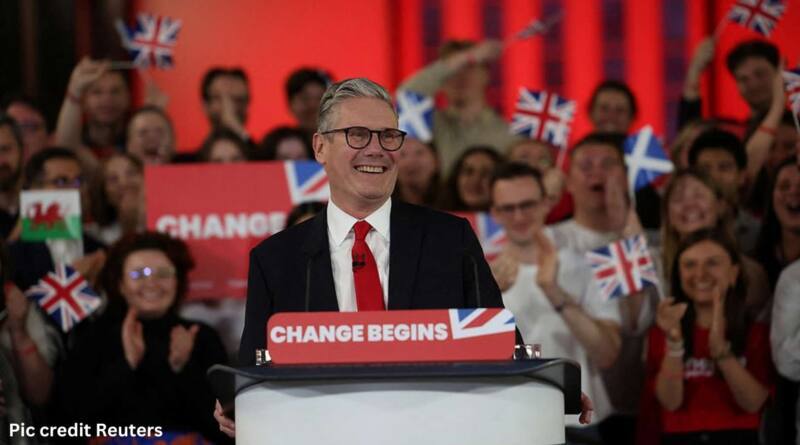Latest On The UK Elections 2024: Know It All
Labour’s huge victory is seen as the result of a severe Tory fall.
Labour emerged victorious in the general election of 2024, with a projected total of 176 seats. However, a sharp 20-point drop in Conservative support has largely contributed to their resounding victory.

The Conservatives will have the fewest seats in history (121), making this the worst result in Conservative history. Two results are still pending. The Liberal Democrats have won more seats (1923–2023) than any other party. But Labour’s total of 412 seats is just fewer than the 419 seats that Tony Blair secured in 1997. Across the nation, their vote share has increased by just less than two points.
Scotland’s support has increased by 17 points, which is the main cause. The party’s support has actually decreased by four points in Wales, but it has increased by half a point in England since 2019.
In votes, the Tories lose out to Reform UK.
With a smaller percentage of the vote (35% in the UK), Labour achieved a resounding victory compared to both Jeremy Corbyn’s 40% of the vote in 2017 and Tony Blair’s three victories combined. In fact, the party’s vote share is the lowest that a one-party post-war government has ever achieved.
Overall, it appears that the Conservatives lost this election rather than the Labour Party winning.
The seats the Conservatives were attempting to defend had the greatest decline in support. The party is eight points behind in seats where they received 25% of the vote in 2019. Nonetheless, they are trailing by 29 points in seats where they received more than 50% of the vote.
One important factor is that in seats the Conservatives were defending, support for reform increased more dramatically—by 16 points—than in seats Labour was defending.
This is at least partially due to Labour supporters’ readiness to strategically vote against Conservative incumbents.
As a result, even though the Liberal Democrats’ national vote share increased by just 0.5 points, they managed to secure a record 71 seats. With only 12% of the vote, the party’s support is still far lower than it was at 23% prior to joining the coalition government in 2010.
Not surprising, Reform performed particularly well in seats where a sizable percentage of voters chose to leave in 2016.
Meanwhile, the Conservatives’ situation has deteriorated due to Labour’s surge in support in seats where the party ranked second to the Conservatives—a significantly better result than anywhere else (apart from Scotland).
The Conservatives have completely erased the significant gains they made in leave-voting regions following the EU vote, particularly in 2019. In seats where less than 45% of voters chose to leave, support for the Conservatives is down 12 points from 2019 to this year.
On the other hand, in seats where over 65% of voters chose to vote leave, party support has decreased by 27 points. With the exception of the final two seats to be declared, the Reform vote exceeded the Conservatives’ margin of defeat in more than 170 of the seats they lost.
While not all Reform voters would have supported the Conservatives in other elections, most did in 2019. These figures highlight how much Rishi Sunak’s party has suffered due to the significant loss of Conservative votes to Reform.
However, Reform has struggled to turn votes into seats; as a result, the party has only managed to win four seats, Nigel Farage among them in Clacton.
The SNP has taken a significant beating. Their vote share has decreased by fifteen points, while Labour’s has increased by seventeen points over the border.
The 2014 independence referendum appears to have undone much of the damage to Labour’s standing in Scotland.
With their best-ever general election showing, the Greens will probably take home 7% of the vote nationwide and gain four seats instead of just one.
They achieved that victory by demonstrating their newly discovered ability to overcome the challenge smaller parties face in first-past-the-post elections by concentrating their efforts on a small number of target seats where they have a strong local government base.
In general, the party’s vote increased more in Labour-held seats than in Conservative-held ones, particularly in areas with a high graduation rate.
Simultaneously, however, they secured two seats in the Tory shires by squeezing support from both Labour and the Liberal Democrats, since people in these districts seemed to have come to believe that the Greens were the party most suited to beat the Conservatives locally.
Lowest participation rate since 1885.
In four elections, independent candidates have defeated Labour in seats with sizable Muslim majorities. The Conservatives also lost another seat with a sizable Muslim population as a result of the independents’ participation.
In seats where more than ten percent of the population identifies as Muslim, the party’s vote is down 11 points on average.
Jeremy Corbyn pulled off an incredible solo show to hold onto his independent seat in Islington North.
Six independent candidates have won all of the seats, the most since the 1950 election, when university seats were eliminated.
Compared to previous elections, turnout is significantly lower, dropping eight points to 60%. Since 1885, this will be the UK election with the second-lowest turnout ever. The 2001 figure was just 59% lower.
Rishi Sunak apologises to the public before leaving the office.
After several cabinet members lost their seats and the extent of the Tory collapse became evident, Rishi Sunak announced his defeat.

After winning the general election, the Labour Party of the United Kingdom easily won a working majority in the House of Commons, garnering 326 seats.
After defeating Rishi Sunak’s party and obtaining a sizable majority in a parliamentary election, Keir Starmer emerged as the new prime minister of Britain, capping 14 years of frequently turbulent Conservative rule.
In his parting speech, Rishi Sunak expressed his regret to the public and acknowledged his defeat. He then left Downing Street to formally submit his resignation as prime minister to King Charles III.
The United Kingdom is expected to face its largest tax load since the immediate aftermath of World War II, with net debt nearly matching yearly economic output, declining living standards, and collapsing public services—particularly the beloved National Health Service, which has been beset by strikes—all contributing factors.
The highlights of the UK election results are as follows:
Conservative Leadership Is a “Bloodbath” in the UK as the Party Looks for a New Path
The British Conservative Party’s leaders started scheming well before Thursday’s disastrous election loss to Labour, which some party insiders claimed would mean the party would be out of power for ten years.
Following 14 years in power, the last eight of which were characterised by turmoil and discord due to the Brexit decision, the Conservatives are currently facing an internal conflict among MPs, grassroots supporters, and funders regarding whether to continue its rightward trajectory or return to the centre.
During the UK election campaign, Rishi Sunak showed his lack of political acumen.
Rishi Sunak’s bid to keep his position as prime minister of Britain came out as lacking in political flair. Even though the Conservative Party had serious issues prior to Friday’s crushing election loss, errors made by the richest prime minister in the country ultimately led to the party’s downfall.
More adept at navigating politics and winning over voters were their predecessors, like Boris Johnson and Tony Blair. It was not necessary for Sunak to call the poll until January 2025. In May, he announced the July 4 date in the pouring rain, defying political advice as Conservative support was steadily declining due to the economy, corruption scandals, and a rotating door of leaders over the previous two years.
Furthermore, voters haven’t yet sensed a significant improvement in the British economy, and the Conservative Party didn’t seem as prepared for the campaign as Labour did.
“I understand your frustration and anguish, and I accept accountability for this defeat,” Sunak declared outside the 10 Downing St. house during his farewell statement as prime minister.
Arguably, Sunak’s greatest error—which led him to issue an apology and, in the opinion of many observers, marked the ultimate demise of the Conservative Party’s campaign—was his June 6 decision to depart early from the 80-year D-day observance in northern France.
Kottayam, Kerala, celebrates the victory of its “son” in the UK elections.
Sojan Joseph is the first Keralite nurse to win a seat in parliament. When Sojan Joseph, the Labour Party candidate, defeated Damien Green of the Conservative and Unionist Party by a margin of 1,779 votes, his father sobbed and clapped. He is currently serving as a borough councillor for the wards of East Stour and Aylesford.

The entire household at Sojan Joseph’s house in the peaceful village of Athirampuzha, close to Kottayam, did not turn out the lights on Thursday night in anticipation of the outcome from Ashford, one of the seats in Kent, the United Kingdom. “Of course, I am thrilled and excited about my son’s victory. We have been waiting to hear this right from the time my son told me he was going to contest the polls,” said his ecstatic dad. All six of Mr. Joseph’s siblings and their offspring reside in the United Kingdom.
“He is a nurse in the National Health Service’s psychiatry department.” After he finished college in Kottayam, he went to study nursing in Bengaluru. For the past 23 years, he has been working in the NHS.
According to Mr. Joseph’s sister, he had no interest in politics while attending this college.
“It was after he arrived in the UK that he developed an interest in politics, and now his and our dreams have come true. I’m just waiting for him to visit our village, “said his sister.
Few other candidates of Indian descent emerged victorious in the 2024 UK elections.
In the general elections, a considerable number of candidates of Indian descent also ran, and some of them fared exceptionally well.
Here’s a list of how Indian-born leaders performed in UK polls:
The Conservative Party’s Rishi Sunak
Although the Conservative Party did not perform well, departing British Prime Minister Rishi Sunak had won Northallerton and Richmond (Yorks).
He defeated Labour’s Tom Wilson by almost 13,000 votes. After the announcement of the election results, Sunak wrote on X, “To the numerous Conservative candidates, the endless volunteers, and the millions of voters: I appreciate your hard work, your support, and your votes.”
Suella Braverman, a Republican Party member
Suella Braverman previously served as Britain’s home secretary. Suella Braverman of the Conservative Party is keeping her seat in the Fareham and Waterlooville constituencies. She was succeeded as interior minister by James Cleverly in the final Sunak government reshuffle. Since 2015, Braverman has served as an MP for Fareham. She served as Home Secretary from October 2022 to November 2023.
Satvir Kaur is a Labour Party member.
Labour Party candidate Satvir Kaur won the Southampton Test constituency with 15,945 votes. She was the first female Sikh leader of a local council in Britain, having also served as Leader of Southampton City Council from 2022 to 2023.
Priti Patel is a Conservative Party member
Priti Patel, ran again from the Essex seat of Witham and won with 37.2% of the vote. In addition, Patel held the position of Home Secretary from 2019 to 2022. She has been an MP for Witham since 2010.
Preet Kaur Gill is a Labour Party member.
Preet Kaur Gill, a member of the Labour Party, won re-election from Birmingham Edgbastom. Gill has previously served as the Shadow Minister for Public Health and Primary Care since 2023.
Shivani Raja is a Conservative Party member.
Shivani Raja defeated the Labour Party’s Rajesh Agarwal with more than 4,000 votes to win the Leicester East seat. Claude Webbe, a former Member of Parliament, and Keith Vaz, an independent, were two of the leading candidates in the Leicester East constituency.
Mishra Navendu (Labour Party)
With 21,787 votes, Labour Party MP Navendu Mishra of Stockport has secured his return to Westminster. Mishra has represented Stockport as an MP since the UK general election of 2019.
Gagan Mohindra is a Conservative Party member.
Gagan Mohindra, received 16,458 votes to win the seat in south-west Hertfordshire. His closest rival, Sally Symington of the Liberal Democrats, finished in second place with 12,002 votes.
Labour Party’s Kanishka Narayan
Kanishka Narayan, a Welsh Labour contender, defeated Alun Cairns, a Conservative Party member who served as the Vale MP from 2010 to 2024, to win the seat. Narayan is now the first Welsh MP from an ethnic minority.
After a decisive victory, Starmer picked his first cabinet.
This Saturday, the first full day of Labour’s rule, will see the first meeting of Sir Keir Starmer’s new cabinet.
The first female chancellor in the UK is Rachel Reeves, and there are a record 11 women in the team of 25 people, including Deputy Prime Minister Angela Rayner.
Following Labour’s overwhelming election victory, Sir Keir named his cabinet on Friday and declared in his maiden speech as prime minister that the process of transformation “begins immediately.”
Speaking at Downing Street, he also pledged to establish a “government of service” to rebuild public confidence in politics.
Labour has referred to its “first steps” as addressing illegal immigration, decreasing NHS waiting lists, and achieving economic stability. These will be the main topics of discussion during the cabinet meeting.
Yvette Cooper is now the home secretary, while David Lammy is now the foreign secretary.

After the King named Sir Keir prime minister at Buckingham Palace, he made the following promise while speaking outside No. 10: “My government will serve you; politics can be a force for good.”
“The work of change begins immediately, but there is no doubt that we will rebuild Britain.”
“I have heard your anger and your disappointment,” Rishi Sunak said to the audience during his parting speech outside No. 10 to Tory candidates.
With 412 seats secured, Labour now has a majority of 174 in the newly formed House of Commons. With a net loss of 251, the Conservatives saw their number of MPs drop to a record low of 121.
With 63 more seats won, the Liberal Democrats now have 71. The SNP suffered a significant defeat, losing 38 seats to now hold only nine, with one constituency still awaiting declaration.
The Greens gained one more MP to make four, while Reform UK won five seats, including leader Nigel Farage’s in Clacton. Plaid Cymru increased from two to four members of Parliament.
Sir Keir quickly filled his top team with appointments within hours of taking office as prime minister. It’s anticipated that he will reveal more ministry positions.
Ms. Rayner will assume leadership of the Department for Levelling Up, Housing, and Communities in addition to her position as Sir Keir’s deputy.
Just three members of the cabinet attended private schools, making up a sizable majority of those with state educations.
Hilary Benn, the secretary for Northern Ireland, and Ed Miliband, the secretary for energy security and net zero, are the other two former members of the last Labour cabinet.
Along with John Healey, the defence secretary, and Pat McFadden, who assumes control of the Cabinet Office, David Lammy has become the new Secretary of State for Foreign, Commonwealth and Development Affairs. Mr. Lammy was a minister in the previous Labour administration.
In the 2016 EU referendum, every member of the cabinet backed Remain. Sir Keir said before the election that the UK would never again join the EU single market in his lifetime.
World leaders congratulated Sir Keir during his first few hours as prime minister over the phone.
According to the White House and Downing Street, US President Joe Biden told Sir Keir he was looking forward to “further strengthening the special relationship” with the UK.

In a social media post, Volodymyr Zelensky, the president of Ukraine, wrote, “I am grateful to Prime Minister Starmer for reaffirming the UK’s principled and unwavering support for Ukraine.”
Meanwhile, the Irish government stated that Sir Keir and Irish Prime Minister Simon Harris had made a commitment “to reset and strengthen” Anglo-Irish relations “with urgency and ambition.”
There are a few surprising appointments in the new government.
Richard Hermer is now the attorney general, replacing Emily Thornberry, who had shadowed the position.
Sir Keir will grant Mr. Hermer, a friend from his days as a barrister, a life peerage, enabling him to sit in the House of Lords and attend cabinet.
Sir Keir has not yet assigned new roles to several members of his shadow cabinet, including Ms. Thornberry, Nick Thomas-Symonds, the shadow minister without a portfolio, and Anneliese Dodds, the shadow secretary for women and equality, as well as the party chairperson.
The incoming administration has appointed Patrick Vallance, the former chief scientific adviser to the government, as a peer to the position of science minister.
In addition, James Timpson was made a peer and named minister of prisons.
He is currently the CEO of the Timpson Group, which employs ex-offenders throughout its UK watch and shoe repair chain.
The BBC understands that Lord Timpson and Lord Vallance will not be present in the cabinet.
In the 708 years that the office has existed, Ms. Reeves is the first female to occupy the second-most significant position in government.
She concluded by saying, “To every young girl and woman reading this, let today show that there should be no limits on your ambitions.”
Ms. Reeves declared that she was “under no illusions of the scale of challenges we face” to her newly assembled team of Treasury officials.
Taking to social media, Mr. David Lammy declared that his appointment as foreign secretary was “the honour of my life.”.
“A reset on Europe, a reset on our relationships with the global south, and a reset on climate” were Mr. Lammy’s top goals, he has been quoted telling the BBC.
Independent Shockat Adam challenged Jonathan Ashworth in Leicester South, one of Sir Keir’s most important allies, over his position in the Gaza War. In Bristol Central, Carla Denyer, the co-leader of the Green Party, defeated Thangam Debbonaire, the former shadow culture secretary.
Shabana Mahmood became justice minister after defeating a challenge from an independent in Birmingham, Ladywood, who supported Gaza.
Former Tony Blair spin doctor Alastair Campbell said on BBC Radio 4’s Today programme: “I think what’s really interesting about the last 24 hours… people are saying when they saw that cabinet walking up Downing Street—just the feeling of change… of a new set of people who look more like us and sound like the rest of the country, and who have been very clear about what the priorities are.”
The members of the Cabinet team have been announced.
- Prime Minister Sir Keir Starmer
- Angela Rayner: Deputy Prime Minister and Secretary of State for Housing, Communities, and Levelling Up
- Rachel Reeves, the Exchequer’s Chancellor
- Pat McFadden, the Duchy of Lancaster’s Chancellor.
- The Secretary of State for Foreign, Commonwealth, and Development Affairs is David Lammy.
- Yvette Cooper, the Home Department’s Secretary of State
- John Healey, the state secretary for defence
- Shabana Mahmood is the Secretary of State for Justice and Lord Chancellor.
- Wes Streeting, Secretary of State for Health and Social Care.
- Bridget Phillipson, secretary of state for education
- Ed Miliband, the State Secretary for Net Zero and Energy Security
- Liz Kendall is Secretary of State for Work and Pensions.
- Jonathan Reynolds is the state secretary for trade and business.
- Secretary of State for Science, Innovation, and Technology, Peter Kyle
- Louise Haigh, the state secretary for transport
- Steve Reed, Secretary of State for Environment, Food, and Rural Affairs.
- The Secretary of State for Culture, Media, and Sport is Lisa Nandy.
- The Secretary of State for Northern Ireland is Hilary Benn.
- Ian Murray, Scotland’s State Secretary
- Jo Stevens, the Welsh Secretary of State
- Lucy Powell, Leader of the House of Commons and Lord President of the Council
- Baroness Smith, Leader of the House of Lords, and Lord Privy Seal
- Alan Campbell is the Chief Whip of the House of Commons.
- Darren Jones, the Treasury’s Acting Chief Secretary
- Richard Hermer KC, the legal representative.
Mr. Sunak has pledged to continue leading the party until the processes for selecting his successor are in place.
Both Sir Jacob Rees-Mogg, the former cabinet minister, and Penny Mordaunt, the former leader of the Commons and twice a contender for prime minister, lost their seats in Portsmouth North.

Increased support for Reform UK, which received 14.3% of the vote and sent party leader Nigel Farage and four other Reform MPs into Parliament for the first time, was a major factor in the Conservatives’ victory.
In the meantime, the Liberal Democrats have grown to be the third-largest party in the Commons. With 6.8% of the vote nationwide, the Greens had the best general election result to date.






Hi there! Would you mind if I share your blog with my facebook group? There’s a lot of people that I think would really enjoy your content. Please let me know. Many thanks
Hi my family member I want to say that this post is awesome nice written and come with approximately all significant infos I would like to peer extra posts like this
Fantastic beat I would like to apprentice while you amend your web site how could i subscribe for a blog site The account helped me a acceptable deal I had been a little bit acquainted of this your broadcast offered bright clear concept
certainly like your website but you need to take a look at the spelling on quite a few of your posts Many of them are rife with spelling problems and I find it very troublesome to inform the reality nevertheless I will definitely come back again